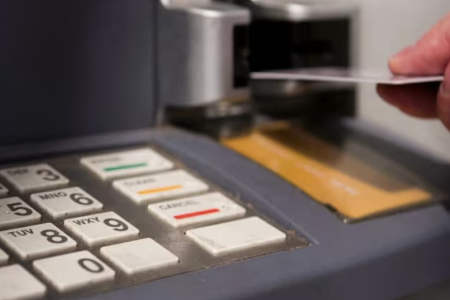The $5 overdraft cap is history—how to protect yourself from rising fees
- Replies 2
Overdraft fees have long been a thorn in the side of many Americans—especially those living on fixed incomes or tight budgets..
A single mistake at the checkout counter could trigger a $35 fee, making everyday banking feel more like a minefield than a convenience.
But now, with a controversial federal cap on overdraft fees effectively dead, some banks have stepped up on their own — and stopped charging them entirely.
Just four months ago, the Biden administration proposed a bold move: capping overdraft fees at just $5.
The plan would have saved American households an estimated $5 billion per year.
But there was one catch — the rule wasn’t set to take effect until October 2025.

That delay gave lawmakers time to act. And they did.
This week, the House of Representatives voted to kill the cap. The Senate had already passed the resolution. Now, it awaits President Trump’s signature.
It’s a major setback for consumer advocates and for the Consumer Financial Protection Bureau (CFPB), the agency behind the proposal.
The CFPB is now under political pressure itself, with calls to halt its work and even shut it down entirely.
But while Washington debates, some banks are already doing what the law couldn’t: cutting out overdraft fees altogether.
Here’s a bit of good news: Overdraft fees aren’t as punishing today as they were five or ten years ago.
Banking experts say many institutions have made meaningful changes—some slashing fees, others eliminating them altogether.
In fact, both Bankrate and NerdWallet now highlight a growing list of banks with overdraft policies that are far more consumer-friendly—including several major national names.
It was a bold move that earned praise from customers and consumer advocates alike.
“No-Fee Overdraft has been a centerpiece of our mission to provide best-in-class, no fee and no minimum products and services to our millions of customers,” the bank said.
The bank said it wanted to make banking more equitable, especially for people with little to no financial cushion.
It eliminated overdraft fees in 2021 and offers free transfers from linked accounts to cover shortfalls.
Online-first banks like Ally often skip traditional fees to attract modern, cost-conscious customers.
A welcome change for customers who've been burned by multiple overdraft hits in the past.
Even if your bank still charges overdraft fees, there are ways to avoid them. Financial experts recommend the following:

What’s your experience been with overdraft charges over the years? Share your story in the comments—your insight could help others save more and stress less. Let’s keep more money in your pocket, right where it belongs.
A single mistake at the checkout counter could trigger a $35 fee, making everyday banking feel more like a minefield than a convenience.
But now, with a controversial federal cap on overdraft fees effectively dead, some banks have stepped up on their own — and stopped charging them entirely.
Just four months ago, the Biden administration proposed a bold move: capping overdraft fees at just $5.
The plan would have saved American households an estimated $5 billion per year.
But there was one catch — the rule wasn’t set to take effect until October 2025.

A $5 federal cap on overdraft fees was proposed under the Biden administration. Image source: Good Morning America / YouTube
That delay gave lawmakers time to act. And they did.
This week, the House of Representatives voted to kill the cap. The Senate had already passed the resolution. Now, it awaits President Trump’s signature.
It’s a major setback for consumer advocates and for the Consumer Financial Protection Bureau (CFPB), the agency behind the proposal.
The CFPB is now under political pressure itself, with calls to halt its work and even shut it down entirely.
But while Washington debates, some banks are already doing what the law couldn’t: cutting out overdraft fees altogether.
Here’s a bit of good news: Overdraft fees aren’t as punishing today as they were five or ten years ago.
Banking experts say many institutions have made meaningful changes—some slashing fees, others eliminating them altogether.
In fact, both Bankrate and NerdWallet now highlight a growing list of banks with overdraft policies that are far more consumer-friendly—including several major national names.
Capital One
In 2022, Capital One became one of the first major banks to say goodbye to overdraft fees—giving up around $150 million in annual revenue to do it.It was a bold move that earned praise from customers and consumer advocates alike.
“No-Fee Overdraft has been a centerpiece of our mission to provide best-in-class, no fee and no minimum products and services to our millions of customers,” the bank said.
Citibank
Also in 2022, Citibank dropped all overdraft and overdraft protection fees.The bank said it wanted to make banking more equitable, especially for people with little to no financial cushion.
Alliant Credit Union
Credit unions often have more consumer-friendly policies than big banks—and Alliant is no exception.It eliminated overdraft fees in 2021 and offers free transfers from linked accounts to cover shortfalls.
Ally Bank
This online bank was ahead of the curve. Ally dropped overdraft fees all the way back in 2020.Online-first banks like Ally often skip traditional fees to attract modern, cost-conscious customers.
Bank of America
While not eliminating fees entirely, Bank of America reduced its overdraft charge from $35 to $10 in 2022—and capped it at two fees per day.A welcome change for customers who've been burned by multiple overdraft hits in the past.
Even if your bank still charges overdraft fees, there are ways to avoid them. Financial experts recommend the following:
- Link your savings to your checking account for automatic overdraft coverage.
- Opt out of overdraft protection for debit and ATM transactions—it may save you from a $35 lunch.
- Set up balance alerts to warn you before your account dips too low.
- Monitor autopayments to avoid surprise charges.
- Keep a buffer of cash in your checking account—$100 or more if you can.
- Switch banks if your current one charges high fees without good reason.
- Unlock free access to 225 exclusive venues with this little-known Bank of America cardholder perk
- Is your bank branch gone for good? Find out which major US banks shut down 110+ locations over the holidays!
Key Takeaways
- A $5 federal cap on overdraft fees was proposed under the Biden administration but has been struck down in Congress.
- The CFPB, which pushed for the rule, is facing operational threats under the Trump administration.
- Five major financial institutions—Capital One, Citibank, Alliant Credit Union, Ally Bank, and Bank of America—have taken voluntary steps to reduce or eliminate overdraft fees.
- Consumers can take action now by reviewing their bank’s policies and using simple tools to avoid overdrafts.
Last edited:






